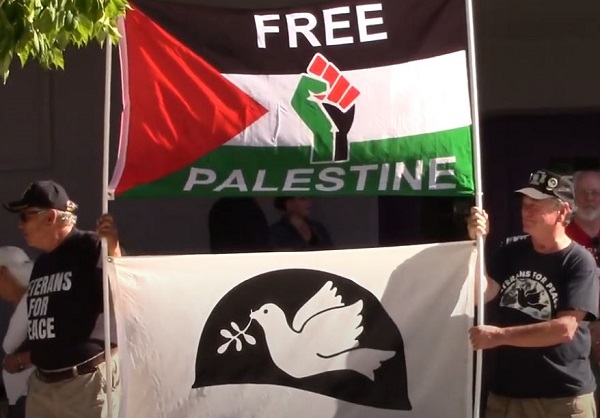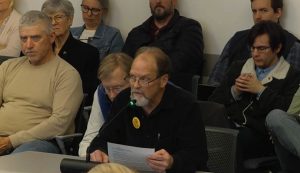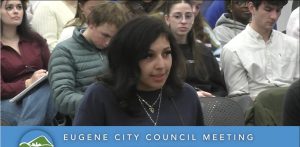Veterans for Peace say ‘Never again’
6 min read
Presenter: KEPW’s Jana Thrift visited with Veterans for Peace at the Val Hoyle town hall Aug. 20.
Jana Thrift (KEPW): We have here Shelley Corteville and she has a story to share with us today.
Shelley Corteville (Veterans for Peace): When I was 13 years old, a church I was going to brought this woman in. She was a Holocaust survivor when she was a child. She lost her entire family. She was the only one that survived.
[00:00:30] You know, we’re taught this in school. But it’s very different when you see somebody up close and personal and you hear their story. Stories always have an impact. That story had a huge impact on me. I don’t remember her name, but I can describe to you in detail what she looked like, what she was wearing, exactly what was behind her, where she stood and how she told this story.
[00:01:13] It left a huge impression on me and being part German, I had a very, very hard time with that part of me. When I was a little kid, we used to be really proud of that. All of a sudden here, I was not proud of that part of me at all.
[00:01:38] I could not understand how a group of people could be so full of hate that they could round up another group of people, put them in camps, and just kill them for no reason. Just lose their humanity.
[00:02:06] Kill little children, kill adults, it didn’t matter. The age, it didn’t matter. The age of the children didn’t matter, if it was an infant, it didn’t matter. They slaughtered people. I can’t imagine being marched off to a gas chamber, being told to use a shower, I just, it’s unfathomable to me. I can’t imagine people being thrown into this mass grave, like they’re nothing, like, they’re just nothing. Like they don’t matter at all. Like they’re not even human.
[00:02:51] And we said that this would never happen again.
The summer when I was 63 years old, that year, I had read numerous books, numerous biographies of survivors, numerous biographies of—some of them were SS men and some of those books talked about men that were Nazis that helped, that risked their lives.
[00:03:28] And I thought, ‘Oh my God, there were some good people. Not everybody was horrible,’ because all of this time, from 13 to 63, I thought all these Germans were just terrible people. And I have this German blood in me. But there’s this huge generalization that we make. There’s this huge generalization that I made all these decades, and here we are.
[00:04:03] Here we are. We are slaughtering people in Gaza, slaughtering them. We have blood on our hands. Our tax dollars are doing this. So many of us are doing something about this and trying to do something about this.
[00:04:24] And people say, if you are trying to do something about this, you do not have blood on your hands. It is the people, the people that are voting for this, the people that are ignoring us, the people that are making excuses. Starvation is not a defense.
[00:04:45] I don’t know how people have lost their moral compass, their empathy, their humanity. I don’t know how that has happened. I just don’t know. It doesn’t make sense to me, and I don’t care what religion you are. I don’t know how the Jewish people, how the Israelis have made this okay. I also don’t believe that every Israeli has made this okay.
[00:05:16] And the reason I doubt is because of my experience reading all of these biographies and knowing that every German and every Nazi and every child that was forced into that military and that regime were not without empathy, and were not without humanity.
[00:05:45] You know, people in our own military are stepping up and getting out. That says a lot. That says a whole lot. I think we need to listen. I feel like the powers to be here trying to make this country lily-white and Christian in a way that’s not really Christian. That’s not the values, and I don’t think it’s the values of the Jewish people or many of the religions. I just don’t, and I think we need to stop the slaughter of the people in Palestine.
[00:06:33] I, I just, I cannot get my head around this. We said this would never happen again. And I got to say, when we send money and weapons to a country, we’re in the war. And when people think and delude themselves to think, ‘Oh, we aren’t in the war. We’re only sending money and arms over there. That means we’re not in the war.’
[00:06:59] We’re in the war. We are at war. We are doing this. We need to understand we are part of killing those people. We are part of this genocide. We are doing this. And we can’t continue. We have to fight.
[00:07:23] So the woman—the Holocaust survivor that came and shared with us—one of the things she talked about was when the men and women were separated. Women were taken by the soldiers and raped, and they had little babies, and they were taken and it was horrifying.
[00:07:50] And the smell, the smell, the smell of people burning. It’s like meat on a barbecue, similar to meat on a barbecue if you can imagine that.
[00:08:08] She can’t stand that. She could not stand that kind of a smell. It’s not exactly like it, but it’s very much like it. And to see those children just ripped away and they had been raped, and girls were raped, and she was raped, and her babies were taken from her. She never married. She couldn’t. She never had sex. She couldn’t, never, never had a relationship beyond friendships. She couldn’t. She just couldn’t.
[00:09:00] And to see little children marched off, the ones that they deemed not good enough to work, just marched off to the gas chambers. And after a while you knew, you knew those were not showers. You knew, and it was devastating and to walk through—there were no toilets. There was no sanitation. There was nothing. It was not clean.
[00:09:43] They treated people like animals. They didn’t care. They just treated them like animals. It’s amazing that anybody survived.
[00:09:59] And that woman said, ‘This should never ever happen again. Humans should never do this again to anyone.’
[00:10:15] And when I see the picture of the Gazans and the little babies so starved, you know, I think of the Holocaust victims, the concentration camp victims, all starved to death. And how did they make it? How are the Gazans making it?
[00:10:39] I don’t understand. It is just not right. Veterans For Peace is, we are against all wars. We are against killing people because it doesn’t work. And I will tell you, I was thinking today, all the times I was ranked in the military, killing those people wouldn’t change a thing. Wouldn’t change a thing. And I know that. And here we are, killing people. And if I can come to that conclusion, damn it, other people can come to that conclusion.
[00:11:20] Presenter: From the Val Hoyle town hall Aug. 20, Shelley Corteville with Veterans for Peace shares her story with KEPW’s Jana Thrift. You can hear Jana Wednesday evenings at 7 on Legalize Survival right here on KEPW 97.3, Eugene’s PeaceWorks Community Radio.




